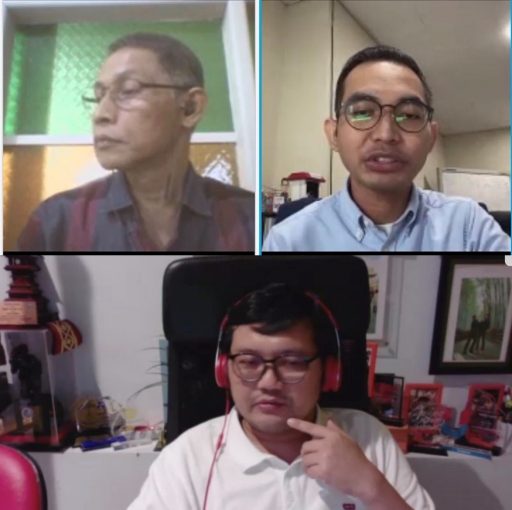
Yogyakarta, June 26th 2020—The Department of Public Policy Management of the Faculty of Social and Political Sciences of Universitas Gadjah Mada, held an event called ‘Bulaksumur Conference’ for the second time with the theme ‘Beyond the Pandemic: Reinventing Citizenship or Expanding Netizenship?’. This online conference presented three expert speakers, they were Ismail Fahmi (Media Social Expert from the Drone Emprit and the Founder of Kernels Media Indonesia), Dr. Subando Agus Maryono, M.Si. (the lecturer of Public Policy Management of FISIPOL UGM), and Dr. Dedy Permadi (the Expert Staff of Digital and Human Resource Development of Ministry of Communication and Informatics).
Broadly, the topic that was discussed in this Bulaksumur Conference was a response related to the massive usage of digital rooms such as social media in the middle of this pandemic. What made this more interesting was, digital activities also could be an opportunity to see how far the dynamics of citizenship and netizenship.
In responding to the citizenship condition in this digital era, Dedy Permadi as the Expert Staff of Ministry of Communication and Informatics, said that related to the democracy, social media became a crucial part in the decision making process and political process. In other word, the existence of social media was one of the factors that affected the government actions. In his analogy, Dedy said that social media became a bridge the process named microdonation, where the features such as likes, share, comment, and etc. became tiny acts that if they were collected, could be a collective act and affected the decision making process and political process. By looking to the massive usage of digital rooms, the government had adopted comprehensive approach to answer the digital era challenges by preparing development in three sides: infrastructure, communication and informatics, human resources, and primary legislation.
For the infrastructure, government tried to make sure that all of the Indonesian people to have the same access of internet usage. In this case, the government was preparing Satria Satelit (Satellite Satria) to be the bridge of the 4G quality of internet service in the villages that still unstable in accessing the internet. Still related to the citizenship in the digital era, the government from the human resources was concerning about human development in purpose for minimizing digital disease, such as information disorder, cyber bullying, hate speech, etc. From the primary side, the government also preparing the Personal Data Security Bill in order to guarantee the security of the citizens personal data in this digitalization era.
The citizenship concept from the government that it promoted regarding the equality of access in the pandemic period, also became a challenge. Because not all of the Indonesian regions had the same connectivity. In this case, Dedy added an explanation from his argument, he said that the government had cooperated with Telkom to build the internet connectivity. The government had a role in serving the internet access facilities in the regions which were considered as not profitable for a company. Meanwhile, Telkom helped by building the internet on the ground segment in the 3.435 villages. Not only that, in order to fulfill the citizens need, especially the students in this pandemic, the government also cooperated with Telkom to give a proper network access as an e-learning facility.
The discussion of citizenship itself would bring us to the netizenship phenomenon in this pandemic period. Ismail Fahmi as a social media expert had done many data analysis related to the Indonesian netizens condition in this pandemic period and the recent implementation of new normal. To the audience, Ismail explained about his summary notes that gave segmentations of the netizen dynamic that were affected by many voices in the form of opinions, critics, and emotions related to COVID-19, which many of these netizen activities were intended to evaluate the government acts. Ismail added that issue which related to trust became a dominant issue that was talked by the netizen in the digital room. More interestingly, the active movements of netizen in the social media were seen as the effective and it caused the realisation of collective solutions to the problems in this pandemic.
As the closing of the discussion topic, Ismail Fahmi also underlined that the netizenship phenomenon in this pandemic period also mirrored the democracy culture that happened because social media became a place that made everyone possible to give their opinions freely. But, this thing had its own paradox. Because, if the netizen were considered as crossing the line, they would get the consequences.
For the example, their accounts would be suspended by Twitter. Not only that, the possibility to become an anonymous person in the social media could be a gap to the usage of buzzer and bots in giving and dominating messages in the digital room. As the result, the real voice of netizen could be faced with the result of bots computation narrations which was supported by the opinion engineering from the buzzer. As the result, the democracy culture, the netizen’s voice , could be threatened by the domination of the buzzer and bots. They were more likely to be heard (Fahmi, 2020).
